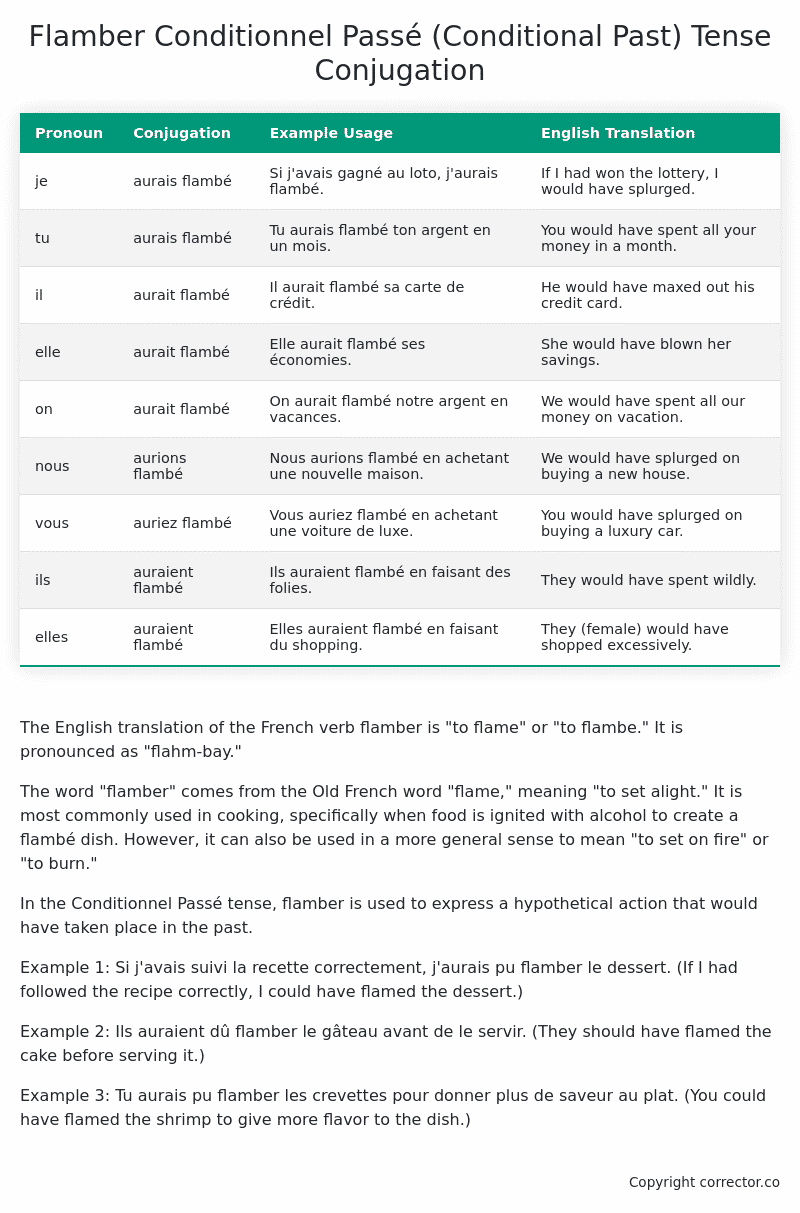Conditionnel Passé (Conditional Past) Tense Conjugation of the French Verb flamber
Introduction to the verb flamber
The English translation of the French verb flamber is “to flame” or “to flambe.” It is pronounced as “flahm-bay.”
The word “flamber” comes from the Old French word “flame,” meaning “to set alight.” It is most commonly used in cooking, specifically when food is ignited with alcohol to create a flambé dish. However, it can also be used in a more general sense to mean “to set on fire” or “to burn.”
In the Conditionnel Passé tense, flamber is used to express a hypothetical action that would have taken place in the past.
Example 1: Si j’avais suivi la recette correctement, j’aurais pu flamber le dessert. (If I had followed the recipe correctly, I could have flamed the dessert.)
Example 2: Ils auraient dû flamber le gâteau avant de le servir. (They should have flamed the cake before serving it.)
Example 3: Tu aurais pu flamber les crevettes pour donner plus de saveur au plat. (You could have flamed the shrimp to give more flavor to the dish.)
Table of the Conditionnel Passé (Conditional Past) Tense Conjugation of flamber
| Pronoun | Conjugation | Example Usage | English Translation |
|---|---|---|---|
| je | aurais flambé | Si j’avais gagné au loto, j’aurais flambé. | If I had won the lottery, I would have splurged. |
| tu | aurais flambé | Tu aurais flambé ton argent en un mois. | You would have spent all your money in a month. |
| il | aurait flambé | Il aurait flambé sa carte de crédit. | He would have maxed out his credit card. |
| elle | aurait flambé | Elle aurait flambé ses économies. | She would have blown her savings. |
| on | aurait flambé | On aurait flambé notre argent en vacances. | We would have spent all our money on vacation. |
| nous | aurions flambé | Nous aurions flambé en achetant une nouvelle maison. | We would have splurged on buying a new house. |
| vous | auriez flambé | Vous auriez flambé en achetant une voiture de luxe. | You would have splurged on buying a luxury car. |
| ils | auraient flambé | Ils auraient flambé en faisant des folies. | They would have spent wildly. |
| elles | auraient flambé | Elles auraient flambé en faisant du shopping. | They (female) would have shopped excessively. |
Other Conjugations for Flamber.
Le Present (Present Tense) Conjugation of the French Verb flamber
Imparfait (Imperfect) Tense Conjugation of the French Verb flamber
Passé Simple (Simple Past) Tense Conjugation of the French Verb flamber
Passé Composé (Present Perfect) Tense Conjugation of the French Verb flamber
Futur Simple (Simple Future) Tense Conjugation of the French Verb flamber
Futur Proche (Near Future) Tense Conjugation of the French Verb flamber
Plus-que-parfait (Pluperfect) Tense Conjugation of the French Verb flamber
Passé Antérieur (Past Anterior) Tense Conjugation of the French Verb flamber
Futur Antérieur (Future Anterior) Tense Conjugation of the French Verb flamber
Subjonctif Présent (Subjunctive Present) Tense Conjugation of the French Verb flamber
Subjonctif Passé (Subjunctive Past) Tense Conjugation of the French Verb flamber
Subjonctif Imparfait (Subjunctive Imperfect) Tense Conjugation of the French Verb flamber
Subjonctif Plus-que-parfait (Subjunctive Pluperfect) Tense Conjugation of the French Verb flamber
Conditionnel Présent (Conditional Present) Tense Conjugation of the French Verb flamber
Conditionnel Passé (Conditional Past) Tense Conjugation of the French Verb flamber (this article)
L’impératif Présent (Imperative Present) Tense Conjugation of the French Verb flamber
L’infinitif Présent (Infinitive Present) Tense Conjugation of the French Verb flamber
Struggling with French verbs or the language in general? Why not use our free French Grammar Checker – no registration required!
Get a FREE Download Study Sheet of this Conjugation 🔥
Simply right click the image below, click “save image” and get your free reference for the flamber Conditionnel Passé tense conjugation!

Flamber – About the French Conditionnel Passé (Conditional Past) Tense
Formation
Common Everyday Usage Patterns
Expressing Unreal Past Scenarios
Polite Requests or Suggestions
Expressing Doubt or Uncertainty
Interactions with Other Tenses
Conditional Present
Indicative Past Tenses
Conditional Future
Summary
Want More?
I hope you enjoyed this article on the verb flamber. Still in a learning mood? Check out another TOTALLY random French verb conjugation!


